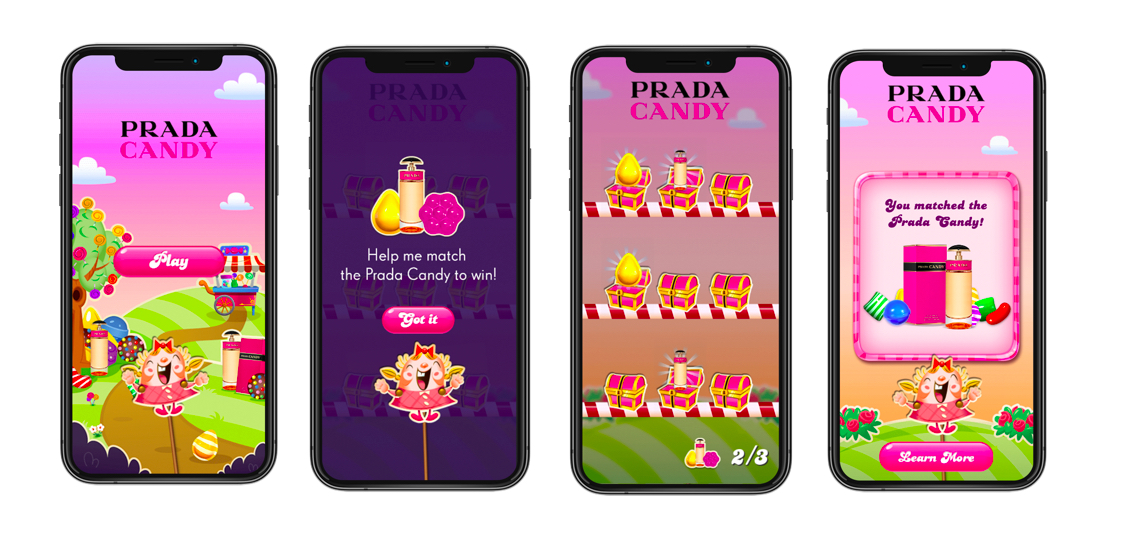For Prada Beauty’s foray into the casual gaming space via a new Candy Crush campaign, the results have been sweet.
Anyone that rides the New York City subway knows that Candy Crush is ubiquitous. This month, Prada’s fragrance brand became the first beauty label to launch a mini-game in the app, tapping into an audience of 200 million monthly active users. On November 24, the luxury fragrance brand launched an in-app playable ad in Candy Crush Saga, the 10-year-old mobile game by Activision Blizzard. Promoting, suitably, the Prada Candy fragrance, the item-matching mini-game allowed users that complete the game to click through to the brand site to receive a free sample of the product.
The game, which runs through December 31, is “an amazing spot to bring Prada into a place that people really wouldn’t expect,” said Nobles Crawford, avp for consumer activation in L’Oréal Group’s Couture Beauty division, which holds the license for Prada Beauty.
“When we dropped it on Thanksgiving, it went gangbusters, [driving] hockey-stick traffic to our website. It was massive. So it was a great execution,” said Crawford, who conceptualized and headed the activation.
That weekly traffic increase was 1,813% compared to the previous week, with a 6.6% clickthrough rate by players who participated in the mini game. All 40,000 allotted samples were requested within 24 hours of launching the game, causing the call to action to switch to a site link. It also led to a “bounce” in Prada Candy sales, said Crawford, which “reversed its downtrend,” while the brand didn’t share exact numbers. The sampling aspect was especially crucial for driving sales, said Crawford.
“We say we want to ‘get the juice into people’s hands,’ and getting it in their hands before the holiday gifting period was important,” he said.
This is the first time Candy Crush has worked its own IP into an in-game playable brand activation within its app.
“This is a new exemplar case for us, where we’re trying to find mechanisms to bring brands deeper in,” said Jonathan Stringfield, vp of business research and marketing at Activision Blizzard. Prada used Candy Crush’s ad targeting capabilities to show the game to women between the ages of 18 and 34. Candy Crush’s audience skews “slightly female,” according to the company.
The key in creating a branded mini game is to “make sure that we’re not jamming a bad experience into the game experience, but [that we’re instead] preserving the game experience,” said Stringfield.
Rather than mobile games that bombard users with game-interrupting ads, Candy Crush is “never going to force it on folks. It’s opt-in, and we reward them for the time,” said Stringfield. The participation rate of the Prada Candy game was 99% of people who chose to click the link, while 95% of them completed the game.
The mini game, in which users must flip over different cards to find matching images, was designed to be somewhat challenging. “We wanted people to really have a sense of accomplishment” before receiving the sample, said Crawford. “When you think about the Candy Crush fan, they are rabid. They love Candy Crush. If it was too easy, they wouldn’t want what was being given.”
The fragrance brand’s main “pillar fragrance” this year is Prada Paradoxe, making it a focus for marketing spend.
“The company had to take a leap of faith with me when I had recommended doing this activation,” sad Crawford. “This is the only money we spent on Prada Candy this half.”
When the activation ends, the brand will evaluate the halo effect on other fragrances in the portfolio.
Prada is the second L’Oréal Group brand to get into the casual gaming space with an in-game playable ad. In August this year, Maybelline partnered with Zynga for a mini mascara game in a variety of its mobile game properties.




